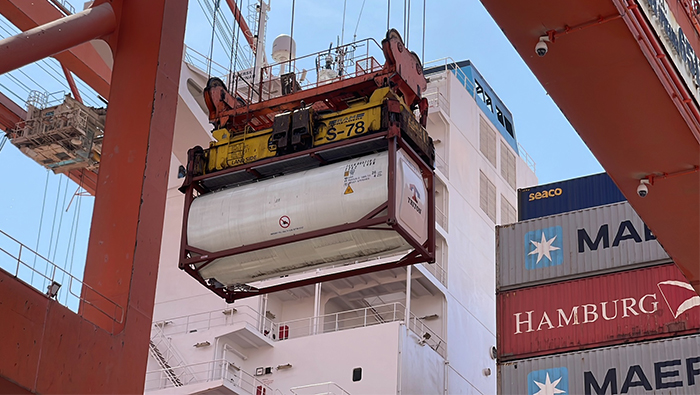
Muscat: Water scarcity remains a critical global challenge, affecting communities and regions across the world. In response to this pressing issue, the Port of Salalah announced a collaboration with Maersk acting as a pilot location to receive fresh water generated onboard Maersk’s vessels using an innovative technology as part of their sustainability initiatives.
Driven by the commitment to sustainability and environmental stewardship, a team of three former seafarers from Maersk embarked on a visionary project to optimise the existing freshwater generation system onboard container vessels. This innovative initiative aims to store and deliver fresh water to ports and regions grappling with water scarcity.
Traditionally, freshwater generated onboard cargo ships through the distillation of seawater has been utilised solely for onboard consumption. However, through this pioneering project, the excess freshwater is efficiently stored in tank containers and delivered to ports in need.
The inaugural shipment of fresh water, totalling 25,000 litres, arrived at the Port of Salalah on April 3, marking a significant milestone in being part of a global initiative as well as optimising the usage of existing water sources. This pilot delivery also serves as a sustainable solution to alternative water sources for various non-potable purposes aligned with the Port of Salalah’s sustainability strategy.
Keld M Christensen, Chief Executive Officer of the Port of Salalah, emphasized the importance of sustainability in port operations and underscored the project's role in advancing environmental goals. He expressed optimism about the project's scalability and its potential to contribute to global efforts in addressing water scarcity.
The project's commitment to quality and environmental standards is evident through rigorous testing conducted by reputable institutions. Water quality assessments conducted by the Ceylon Institute of Scientific & Industrial Research have confirmed compliance with World Health Organization standards, ensuring safety and reliability.
Furthermore, a Life Cycle Assessment study conducted by the Danish Technical University has highlighted the project's environmental benefits compared to traditional water delivery methods.
The freshwater delivered through this innovative system has versatile applications, including port facilities maintenance, ship repair, container washing, firefighting, and humanitarian aid. The project opens avenues for collaboration with stakeholders worldwide to expand access to clean drinking water and address humanitarian needs.
Leonardo Sonzio, Head of Fleet Management and Technology at Maersk commended the collaborative efforts and emphasized the project's potential to make a meaningful impact on global water security. He expressed Maersk's commitment to exploring opportunities for expanding this initiative to more ports and communities in need.
The Port of Salalah looks forward to further collaboration with Maersk and other partners to advance sustainable solutions and contribute to a water-secure future for all.
The Port continues to actively contribute to Oman’s 2040 vision and objectives and support Oman’s economic diversification strategy.
Strategically located on the trade crossroads between Asia and Europe, and serving the markets of East Africa, the Red Sea, the Indian Subcontinent, and the Arabian Gulf – the Port of Salalah is operated by APM Terminals as part of the APM Terminals global terminal network. The port operates both a container terminal and a general cargo terminal.
A.P. Moller-Maersk is an integrated container logistics company working to connect and simplify its customers' supply chains. As a global leader in shipping and logistics, Maersk is committed to driving sustainability and innovation to create a more resilient and sustainable future.